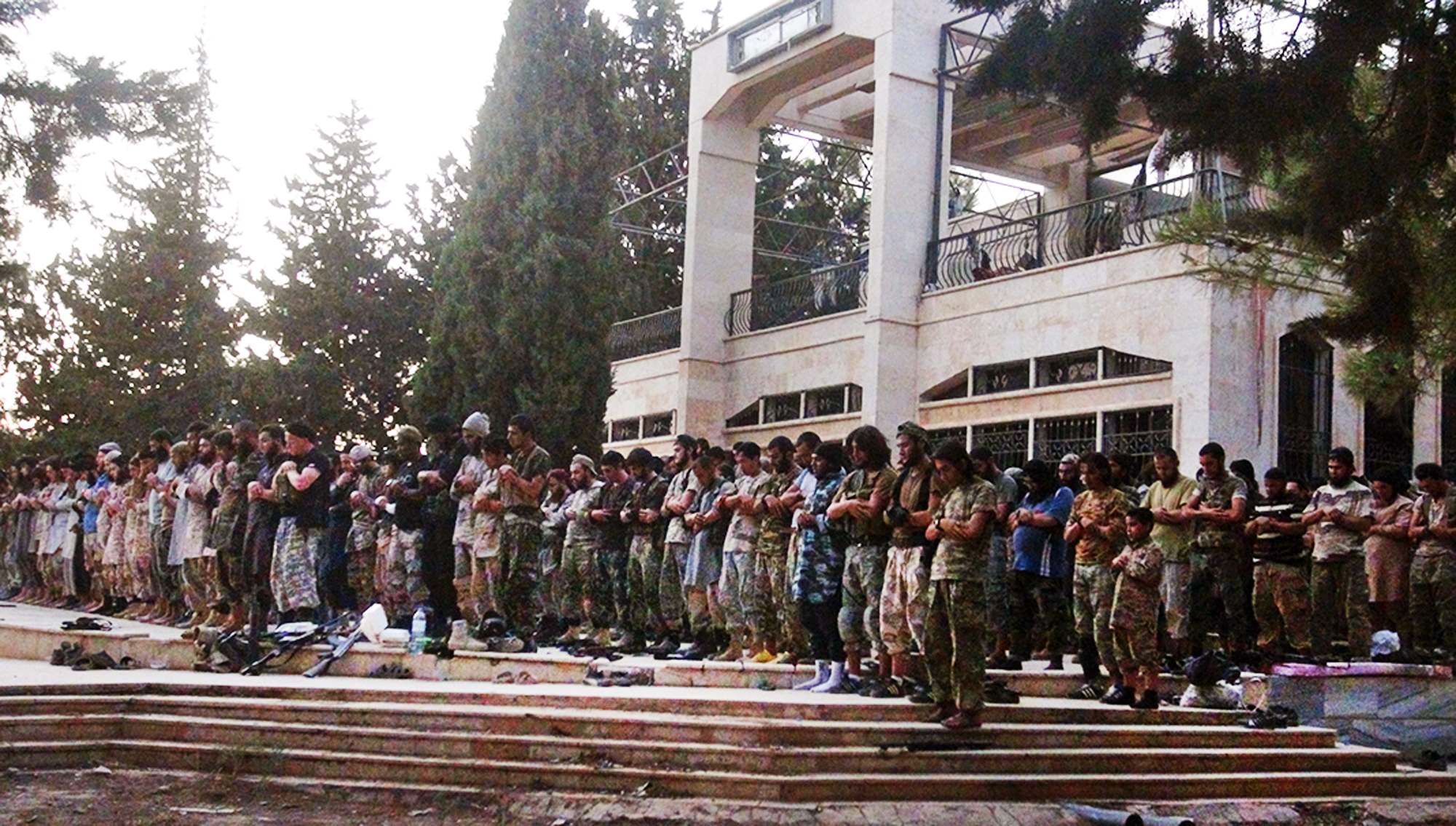The deadly allure of jihad
Islam Yaken was once a middle-class Egyptian with big dreams. Now he fights for ISIS.

A free daily email with the biggest news stories of the day – and the best features from TheWeek.com
You are now subscribed
Your newsletter sign-up was successful
HE WINCED AT the mere mention of his son's name, visibly overcome by an unceasing thought that he struggled to articulate. He looked down to hide the tears in his eyes.
"You have to understand, I am in pain," said Yaken Aly, choking on the words: "My son is gone."
Aly raised his son, Islam Yaken, in Heliopolis, a middle-class Cairo neighborhood with gardens and trendy coffee shops, and sent him to a private school, where he studied in French. As a young man, Yaken wanted to be a fitness instructor. He trained relentlessly, hoping that his effort would bring him success, girlfriends, and wealth. But his goals never materialized. He left that life and found religion, extremism, and, ultimately, his way into a photograph where he knelt beside a decapitated corpse on the killing fields of Syria, smiling.
The Week
Escape your echo chamber. Get the facts behind the news, plus analysis from multiple perspectives.

Sign up for The Week's Free Newsletters
From our morning news briefing to a weekly Good News Newsletter, get the best of The Week delivered directly to your inbox.
From our morning news briefing to a weekly Good News Newsletter, get the best of The Week delivered directly to your inbox.
"Surely, the holiday won't be complete without a picture with one of the dogs' corpses," Yaken, now 22 and fighting for the Islamic State of Iraq and Syria, also known as ISIS, wrote in a Twitter post in July, during Ramadan.
The West is struggling to confront the rise of Islamic extremism and the brutality committed in the name of religion. But it is not alone in trying to understand how this has happened — why young men raised in homes that would never condone violence, let alone cold-blooded murder, are joining ISIS and al Qaida. It is a phenomenon that is as much a threat to Muslim nations as to the West, if not more so, as thousands of young men volunteer as foot soldiers, ready to kill and willing to die.
"I am living," Aly said, "just to give his mother the strength to go on."
But it is here, in the fabric of this community, the living rooms, streets, mosques, and halls of power, that the fertile ground of extremism has been prepared.
A free daily email with the biggest news stories of the day – and the best features from TheWeek.com
THERE IS NO single path that leads to jihad, but in exploring Yaken's life, signposts emerge. There are influences familiar and easy to discuss, like a lack of economic opportunity and a renewed sense of political alienation, especially among youths. But there are also more delicate subjects — less often publicly debated, let alone dissected — like the increasingly conservative thinking that defines the faith for many Muslims today, or sexual repression among young people who are taught that their physical and emotional desires can bring them eternal damnation.
"Sometimes I feel like I could have ended up like that," said Hossam Atef, 20, one of Yaken's closest friends in Egypt. "As a young man, you are always torn. You always want both this life and the afterlife."
This conundrum, often presented as a choice between a modern Western lifestyle and living a pious life, is central to understanding how Yaken transformed from an ambitious bodybuilder who tried to cast his charm on women to a jihadist violently imposing the strictest social code. It seems almost too common, like a caricature of the men who eventually grow beards and kill, but it is Yaken's past, too. He was a party boy; he dated girls and posed for photos with his shirt off, flaunting his physique. He worked out hard in the gym and built a sizable community on Facebook. He had girlfriends. And in the close company of his male friends, he boasted about having sex with women.
"Every guy dreams of having a six-pack so he can take his shirt off at the beach or at the pool and have people check him out," Yaken said, playfully, in an exercise video he shot in his home about two years ago. He sat with his legs crossed on a prayer rug that he also used as an exercise mat and proceeded with a series of sit-ups and crunches.
It was an exciting, if chaotic, time in Egypt. The country's longtime ruler, Hosni Mubarak, had been ousted, and Egyptians tasted what it was like to chart their own destiny. For Yaken, that meant an opportunity to build his own business as a physical trainer. He offered private lessons at small neighborhood gyms and made a series of exercise videos that he posted online. He developed a modest following among young men who shared his interest, including Atef, a photographer who reached out to Yaken, asking to take pictures of him for a bodybuilding blog.
But Yaken struggled. He worked hard but, according to Atef, could not secure a job at a well-established gym. Feeling trapped, Yaken often spoke about leaving Egypt, as do many young men.
"His dream was to be a great personal trainer," Atef said. "He wanted to work abroad, have fun, and get a hot girlfriend."
When Yaken was optimistic about his future, when he slipped into tight T-shirts for his workout routines, his lack of religious devotion was not much of an issue. His mother and two sisters were veiled. His father urged him to fast and pray. The call to prayer blasted through the streets five times a day. But in his life, it remained in the background.
YET AS HIS dreams began to crash into Egypt's depressed economy and political turmoil, Yaken started to feel guilty about his lifestyle choices, his friends and family said. He scolded himself for missing prayers, for disobeying his parents, for betraying the conservative values of his community. But most of all, Atef said, Yaken felt guilty about his relations with women.
"When you're doing something wrong, you still remember God," Atef said, emphasizing that religion had remained central to his and Yaken's identities even when they drifted away from it. "He had sex with women."
And then, already vulnerable and torn, Yaken lost a close friend in a motorcycle accident. This was in March 2012, amid the prelude to Egypt's first democratic presidential election. His business dreams were sinking, his friend had died, and the streets were filled with Islamic slogans promoting the candidates of the Muslim Brotherhood. Shaken, Yaken decided to turn to religion.
He grew his beard, he stopped going to parties, he refused to take pictures with his shirt off, and he unfriended all the women he knew on Facebook. But his newfound commitment to religion had not yet veered in the direction of militancy and jihad.
"People think that once he started to grow a beard, he was on that strict religious track," said Khaled Adel, who knew Yaken for more than 10 years and remained close to him throughout his religious evolution. "No. He was still like us."
Looking slightly embarrassed, Adel, 23, pulled up a video on his laptop that he had shot while sitting at a coffee shop with Yaken and another friend, Mahmoud el-Ghandour.
"We all know that women are a problem for every young man," Yaken professed in the clip, posing as the host of a show they half-jokingly called Piety and Chicks.
It was less than three weeks after the death of his friend. The three men discussed topics like the benefits and disadvantages of pornography, masturbation, sex, and the temptations posed by women.
"Skintight pants, skimpy clothes, breasts, flowing hair," el-Ghandour began in another part of the video.
"Stop, stop, enough!" Yaken begged, laughing and shielding his ears. "I can't bury my head forever to not see women. What am I supposed to do?"
In his quest for answers, Yaken found Sheik Muhammad Hussein Yacoub, a popular Salafist preacher with tens of thousands of followers. At the time, the Muslim Brotherhood was coming to power, granting Islamists of all shades unprecedented freedom to voice the full range of their political demands. Sheik Yacoub appeared regularly on at least two television channels, repeatedly calling for Egypt to enshrine sharia law in its new constitution. He enjoyed an even broader presence online, and his Friday sermons drew an audience that filled mosques and spilled out into neighboring streets.
"Suppose a young man falls in love with a girl in college," Sheik Yacoub said in one of hundreds of sermons published on his YouTube page. "He doesn't touch her or talk to her or send her messages. He doesn't even look at her."
"That's still zina!" he yelled, using the Arabic term for the sin of adultery and fornication.
Sheik Yacoub is one of many ultraconservative preachers who claim to uphold the most authentic Islamic values, wielding influence and authority through their uncompromising views. They span a broad spectrum, with apolitical clerics on one end and militant jihadists on the other, but they all share a rigid understanding of religion characterized by an intolerance for the other, especially other Muslims observing a more tempered approach.
Yaken stopped going to coed gyms. And he immersed himself in worship, waking up every day at dawn to pray at his neighborhood mosque. But this did not allay Yaken's anxieties, friends said. His emotional crisis only deepened.
"One time, we were walking down the street, and a woman was walking ahead of us," Adel said. Yaken took hold of his hand, he recalled, jerking him forward to speed past the woman so that he would not "have to look at her." "He was handing himself over blindly to religion," Adel said.
Just as Yaken's religiosity began to peak, the Egyptian army stepped in and removed President Mohammed Morsi of the Muslim Brotherhood by force, reversing the gains made by the broader Islamist movement. When the army moved to consolidate its power, silencing all opposition, Yaken's faith in the political process faltered, and he felt fully removed.
THE LAST TIME Yaken went to pray at his neighborhood mosque, in August 2013, he looked noticeably different. "He had shaved his head and beard," Sheik Ramadan Fadl, an imam at the mosque, recalled. "When I asked him why, he said he was going to jihad."
Yaken obtained a Turkish visa and traveled to Syria days later without telling his friends or family. His decision became a focus of public attention in Egypt and abroad after he flooded social media with his extremist ideas and images of his radical new self.
According to the Egyptian Interior Ministry, there are at least 600 Egyptians fighting with ISIS. Experts believe that there are more, but beyond the immediate head count of those on the ground, there are broader circles of supporters who openly identify with Yaken's means and motivations.
"People will never know what they don't taste or experience," said el-Ghandour, Yaken's friend. They met on their first day at Ain Shams University in Cairo and grew close. El-Ghandour eventually followed Yaken to Syria, saying they "ate, lived, and worked" as part of the same ISIS unit.
El-Ghandour, 24, returned to Egypt for reasons he would not disclose and has since come under police surveillance. He follows Yaken's updates on his Twitter account, which recently featured as its cover photo a picture of the Jordanian pilot whom ISIS militants set ablaze last month.
"Islam found what he was looking for," el-Ghandour said wistfully. "A life free of the sins he renounced, a greater cause, an Islamic state."
Yaken also found an opportunity to distinguish himself as a fitness instructor — for militants. Wearing a snug, black ISIS T-shirt, camouflage pants, and a pair of cutoff gloves, he posted his latest public workout video last summer, demonstrating how to stay fit for battle.
"This video is dedicated to the mujahedeen in Syria, and to others who plan on coming here," Yaken said, adding that he had been deployed in a region with no "weights or gyms."
He lifted a log, placed it over his shoulders, and counted eight squats.
This article was originally published Feb. 18 in The New York Times. Reprinted with permission.
-
 Will increasing tensions with Iran boil over into war?
Will increasing tensions with Iran boil over into war?Today’s Big Question President Donald Trump has recently been threatening the country
-
 Corruption: The spy sheikh and the president
Corruption: The spy sheikh and the presidentFeature Trump is at the center of another scandal
-
 Putin’s shadow war
Putin’s shadow warFeature The Kremlin is waging a campaign of sabotage and subversion against Ukraine’s allies in the West
-
 A peek inside Europe’s luxury new sleeper bus
A peek inside Europe’s luxury new sleeper busThe Week Recommends Overnight service with stops across Switzerland and the Netherlands promises a comfortable no-fly adventure
-
 A long weekend in Zürich
A long weekend in ZürichThe Week Recommends The vibrant Swiss city is far more than just a banking hub
-
 Late night hosts lightly try to square the GOP's Liz Cheney purge with its avowed hatred of 'cancel culture'
Late night hosts lightly try to square the GOP's Liz Cheney purge with its avowed hatred of 'cancel culture'Speed Read
-
 Late night hosts survey the creative ways America is encouraging COVID-19 vaccinations, cure 'Foxitis'
Late night hosts survey the creative ways America is encouraging COVID-19 vaccinations, cure 'Foxitis'Speed Read
-
 The Daily Show's Trevor Noah carefully steps through the Israel-Palestine minefield to an 'honest question'
The Daily Show's Trevor Noah carefully steps through the Israel-Palestine minefield to an 'honest question'Speed Read
-
 Late night hosts roast Medina Spirit's juicing scandal, 'cancel culture,' and Trump calling a horse a 'junky'
Late night hosts roast Medina Spirit's juicing scandal, 'cancel culture,' and Trump calling a horse a 'junky'Speed Read
-
 John Oliver tries to explain Black hair to fellow white people
John Oliver tries to explain Black hair to fellow white peopleSpeed Read
-
 Late night hosts explain the Trump GOP's Liz Cheney purge, mock Caitlyn Jenner's hangar pains
Late night hosts explain the Trump GOP's Liz Cheney purge, mock Caitlyn Jenner's hangar painsSpeed Read